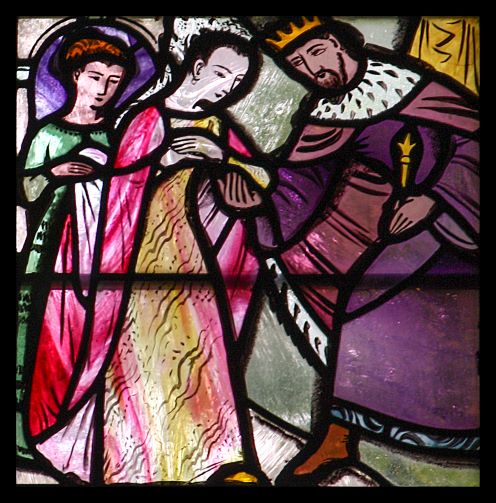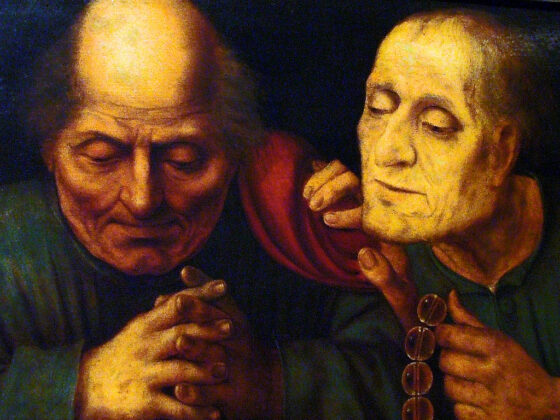The hand of Providence is mysterious indeed. The Solomonic Preacher repeatedly asks the “who knows” question, and answers: “no man knows what is to be, and who can tell him what will be after him?” (Eccles. 10:14). And yet Providence plays a major role in one of only two books of the Bible that do not mention God: the book of Esther.
Passover and Purim are fraternal twins, celebrating God’s victory over the powers of darkness. Deliverance from God may come by a miracle at the Red Sea; it may also result from a risky human initiative, overseen by a kindly Providence. Vashti’s fall and Esther’s rise to royal eminence comes just in time to thwart a genocidal plot against her people by Haman, the proto-Nazi, whose fall in turn places the regime of the Great King in the prudent hands of her uncle Mordecai. Haman’s wife Zeresh sees the handwriting on the wall: “If Mordecai, before whom you have begun to fall, is of the Jewish people, you will not overcome him but will surely fall before him” (Esther. 6:13).
So in our day we come to the case of Amy Coney Barrett. The countdown to destiny begins when, despite the best efforts of her doctors and her expressed wish to survive past Election Day, Justice Ruth Bader Ginsburg succumbs on September 18, 2020. On September 26, much to the consternation of his opponents and even some of his own party, President Donald Trump nominates Judge Barrett as Ginsburg’s successor on the Supreme Court, and Senate Majority Leader Mitch McConnell announces a process for her swift confirmation by the Republican Senate majority.
War now breaks out in Congress and the media. It is war because the decisive issue in the culture since 1973 has been the Court’s Roe v. Wade decision mandating abortion on demand. Like all Republican appointees for the past thirty years, Judge Barrett is accused of planning to overturn Roe, and like all the others she sidesteps the issue in her confirmation hearings, claiming that her decisions will be made based on the text of the Constitution, with due respect for precedent. In doing so, she is coy like Esther in approaching the powers that be.
Her opponents argue that she should be disqualified because her Christian dogma “lives strongly within her” and will determine her decisions. This accusation is part of a larger move to sideline orthodox Christians in the public square, an attack pursued not by secularists alone but by such “good” Roman Catholics as Joe Biden and Nancy Pelosi.
Nevertheless, guided by the steady hand of Uncle Mordecai McConnell, Judge Barrett is confirmed and seated as Justice Barrett on October 27. The judicial lot is cast….
One week later, Joe Biden was elected President, and Donald Trump began a disastrous legal and political campaign to “repeal the steal.” On December 11, the Supreme Court rejected a lawsuit from the state of Texas, supported by 19 Attorneys General and 126 Republican members of Congress, asking the Court, in effect, to nullify the returns of the Presidential election in four states that Donald Trump lost. Justice Barrett and two Trump appointees, Neil Gorsuch and Brett Kavanaugh, joined in the 7-2 majority decision.
Despite Justice Barrett’s vindication of her impartiality as a judge, her opponents were not satisfied. In April 2021, Democrats, echoing Trump’s rhetoric of outrage, called for adding four Biden-picked justices to the Court on the grounds that Republicans have stolen the majority. Naked as this power play was, it could not even make it out of the gate in the now Democratic-controlled Congress, leaving the bloc of nine in place. Little more than a year later, with the Dobbs abortion case pending, a draft opinion overturning Roe was leaked aiming to intimidate one of the five “conservative” justices not named John Roberts. War now breaks out in Congress and the media – do I repeat myself? Whether this brazen ploy succeeds (I write on May 2), we have good reason to think Amy Barrett will not be the weak reed that bends.
Shakespeare’s heroine Portia in The Merchant of Venice is among his types of Lady Wisdom. In the climactic trial scene in the case of Shylock the Jew, Portia, clothed in judicial drag, towers over the heads of men, whether it be her husband Lorenzo, or Antonio the merchant, or the Doge. “I stand for law,” Shylock cries, and when she appears to uphold his claim, he lauds her as “a Daniel come to judgment!” She then awards him every ounce of the merchant’s flesh but not a drop of blood. A Daniel indeed! Yet Portia herself is not Wisdom incarnate but is subject to the terms of her absent father’s mysterious will for her dowry. “The lottery of my destiny bars me the right of voluntary choosing,” she confesses. A higher power, a higher mercy, rules the affairs of grubby Venice and of ethereal Belmont.
Will Amy Coney Barrett be an Esther come to judgment? Providence is best recognized in hindsight, but I do think Scripture gives us examples of how God delivers His people in the vicissitudes of history. As to where the hand of Providence will lead this nation, only He knows Who “covereth the faces of judges” but Who also “bringeth the princes to nothing.”
Perhaps, like the Jews of Esther’s day, we are called merely to fast and pray for her, saying, “Lord, have mercy!” Judgment to follow.
Postscript from Dobbs
On June 24, 2022, the Supreme Court issued its judgment on abortion in Dobbs v. Jackson Women’s Health Organization, overturning the precedential cases of Roe v. Wade (1973) and Planned Parenthood v. Casey (1992). The majority opinion was written by Justice Alito, joined by Justices Gorsuch and Barrett, with Justices Thomas and Kavanaugh concurring in full, Chief Justice Roberts concurring in part, and Justices Breyer, Kagan, and Sotomayor dissenting.
One controversial political issue raised by Dobbs is whether by overturning Roe and Casey, the majority was threatening the status of recent decisions such as Obergefell v. Hodges on same-sex marriage. The majority writes emphatically:
To ensure that our decision is not misunderstood or mischaracterized, we emphasize that our decision concerns the constitutional right to abortion and no other right. Nothing in this opinion should be understood to cast doubt on precedents that do not concern abortion. (page 66)
Justice Thomas is not so sure. While Thomas concurs in the majority opinion that the Roe and Casey precedents are illegitimate applications of the due process clause of the 14th Amendment, he goes on to question whether any of these precedents can be derived from the text (pages 2-3).
I strikes me that Justice Barrett, along with her comrades, doth protest too much. Pragmatically, they do not want abortion to be drawn into the wider culture war about sexuality and marriage, but if the right to abortion is not “deeply rooted in nation’s history and tradition” (page 5), cannot the same can be said about the right to same-sex marriage?
It should come as no surprise that exemplars in Scripture and literature often put prudence over strict moral purity. Esther accepted marriage to a pagan polygamist, and she claimed, rhetorically at least, that she would not intercede with the King if her people were merely enslaved, not exterminated (Esther 7:4). Portia, having failed to persuade Shylock to be merciful, resorted to a legal technicality to defeat him, leading to his forced conversion to Christianity. None of these compromises need besmirch the courage and integrity of our heroines – and this includes Amy Coney Barrett – nor contradict the truth that God’s providence rules over the affairs of men (Genesis 50:20).
Photo credit: “Queen Esther before the King” by Lawrence OP is licensed under CC BY-NC-ND 2.0.





